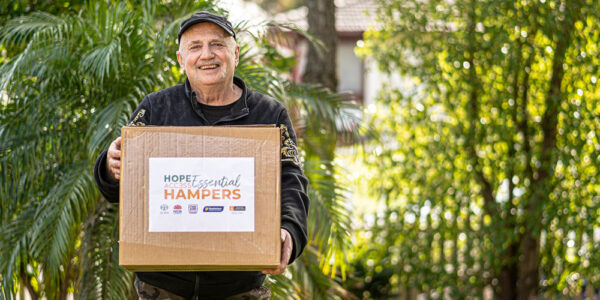Since the outbreak of COVID-19 in Australia, the Adventist Development and Relief Agency (ADRA) Australia has been helping the increasing number of people impacted by the global pandemic.
For many, the overwhelming need has been for food and mental health support due to widespread income and job losses. But those experiencing homelessness also face a higher risk of infection.
According to Homelessness New South Wales, “People experiencing homelessness may be at particular risk of contracting COVID-19 due to crowded accommodation and potential lack of access to hygiene facilities such as showers and laundries, as well as stressed immune systems, and close contact with highly transient persons.”
This was the reality facing Ross if he had not been introduced to ADRA.
Ross was happily living out his retirement with his wife in western Sydney, but in the space of a week, his life was turned upside down.
“My wife passed away very suddenly,” Ross says. “She was only 47. I was quite shocked and heartbroken, and I wasn’t in a good place. And then, on top of that, I was told by New South Wales Housing I wasn’t allowed to stay in the house anymore as I didn’t co-sign the lease with her.”
Ross began the painful process of selling his beloved pets and cleaning his house in preparation to move out. With nowhere to go and no support, his grief threatened to take over.
“I was on the verge of a nervous breakdown,” Ross says. “I was miserable … things weren’t looking very good at all.”
Ross was at his breaking point when someone suggested he visit the ADRA Community Centre in nearby Macquarie Fields. There, Ross began working with one of the counselors, who helped him face the trauma of losing his wife. He also accessed subsidized food hampers and, with the help of the ADRA staff and volunteers at the ADRA Centre, was able to secure his housing tenancy, which was a huge relief.
“I now am considered a tenant, and I’m allowed to stay in the same place. I don’t have to move, which has added considerably to my stability,” Ross says.
The ADRA Centre was also there for Ross during the COVID-19 pandemic, providing him with telephone counseling and support while he self-isolated, as he was at a higher risk of contracting the virus due to his age and respiratory illness.
“During the COVID virus, they’ve been good,” Ross says. “It was exactly the same as coming here. The only thing was, of course, food was delivered, and I had phone counseling.”
For Ross, coming to the ADRA Centre was the first step to getting his life back on track and processing the depression and hopelessness that threatened to take over his entire life. And now, thanks to the support he has received, he is also developing new skills and flourishing.
“With the counseling, I feel that I’m getting much better, and then the housing problem is gone,” Ross says.
Hardship, homelessness, and mental health crises are deepening under the growing weight of uncertainty of COVID-19. ADRA, in partnership with Adventist communities, is able to help address some of these issues.
ADRA Australia’s volunteer-run projects feed, clothe, house, connect, and empower people to overcome hardships and crises to help them get back on their feet.
The original story was posted by Adventist Record.



